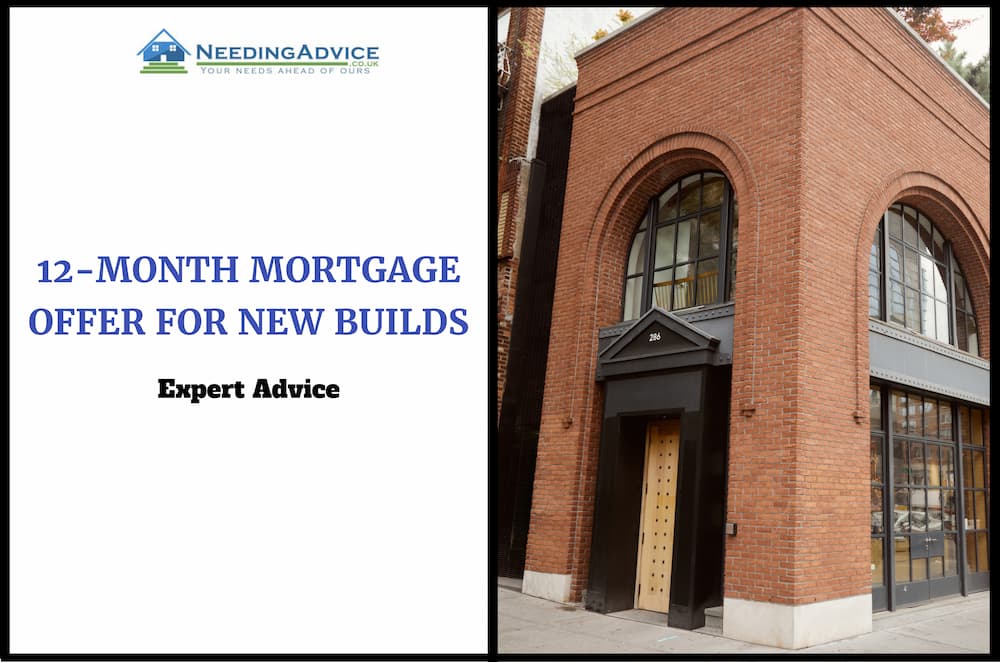In the ever-evolving landscape of the UK property market, securing the right mortgage offer is crucial. This is especially true for new builds, where buyers are often navigating uncharted territory. One option that has been gaining traction is the 12-month mortgage offer.
This guide will dive deeper into the intricacies of a 12-month mortgage offer for new builds, shedding light on its benefits, potential pitfalls, and how it could be the key to unlocking your dream home. Whether you’re a first-time buyer or a seasoned investor, understanding the nuances of this mortgage offer could be instrumental in your property journey.
Stay tuned as we unravel the complexities of the 12-month mortgage offer and explore how it is reshaping the new build sector in the UK.
Post Topics
Definition of a 12-month mortgage offer for new builds
Why choose a 12-month mortgage offer for new builds?
Benefits of a 12-month mortgage offer for new builds
Flexibility in choosing the right property
Advantages of using a mortgage broker for a 12-month mortgage offer
Disclaimer: The information provided in this article regarding the 12-month mortgage offer for new builds is subject to the lender’s approval. It’s important to note that while the initial offers on new builds could be for a duration of 6 or 9 months, there is a possibility of extensions up to 12 months. However, the extension is not guaranteed and is solely at the discretion of the lender. Always consult with a mortgage broker or financial adviser for personalised advice before making any decisions, especially in cases where the initial offer duration may need to be extended.
Definition of a 12-month mortgage offer for new builds
A 12-month mortgage offer for new builds is a financing option provided by certain lenders specifically for individuals purchasing newly constructed properties. This offer allows homebuyers to secure a mortgage with a fixed interest rate for a period of 12 months, providing financial stability during the initial year of homeownership.
The benefits of this offer include the ability to budget effectively, as well as protection against potential interest rate increases during the first year of homeownership. The amount covered and the duration of the offer may vary depending on the lender and the specific terms of the mortgage.
In addition to the mortgage offer, newly built properties often offer cost savings on energy bills compared to existing homes. Builders are incorporating energy-efficient features such as high-performance windows, insulation, and heating/cooling systems, which can result in lower utility costs for homeowners. These energy-efficient features not only save money but also contribute to a more environmentally friendly living space.
Overall, a 12-month mortgage offer for new builds provides financial support and stability for homeowners during the first year of ownership, while new-build properties offer potential long-term cost savings on energy bills.
Why choose a 12-month mortgage offer for new builds?
When it comes to purchasing a newly built property, choosing a 12-month mortgage offer can provide numerous benefits and flexibility for the buyer. This type of mortgage offer allows individuals to secure their financing for a longer period, providing peace of mind and ample time to complete the purchase process for a newly built property.
With the extended timeframe, buyers can also take advantage of potential property value increases and have more time to plan and budget for any additional costs associated with the new build. Additionally, a 12-month mortgage offer can offer protection against potential interest rate hikes and fluctuations in the housing market, providing stability throughout the home-buying process.
Overall, opting for a 12-month mortgage offer for new builds can provide buyers with the time and flexibility needed to secure their dream home without unnecessary stress or financial strain.
Benefits of a 12-month mortgage offer for new builds
Here’s a concise breakdown of the advantages associated with a 12-month mortgage offer for new builds:
- Faster Move-In: New builds are often ready for occupation more quickly than existing properties, allowing buyers to move in and start enjoying their new home and community without delay.
- Energy Efficiency: Designed with the latest standards in mind, new builds can offer significant savings on energy bills due to their energy-efficient features.
- Lower Running Costs: Thanks to modern materials and technologies, new builds typically have lower running costs, making them an economically wise choice for homeowners.
- Smoother Mortgage Process: The condition of new builds and their compliance with current building regulations often result in a more straightforward and less complicated mortgage application process.
- Customisation Opportunities: New builds provide the chance to select fixtures and fittings, enabling homeowners to personalize their living space to match their tastes and lifestyle needs.
- Modern Living Standards: With new builds, homeowners benefit from the latest in design and construction, ensuring a comfortable and modern living environment.
These points highlight the practical and financial benefits of opting for a 12-month mortgage offer on new builds, from quicker move-in times and lower energy costs to personalised living spaces and a streamlined buying process. If you are starting your mortgage application, we would suggest you contact a specialist mortgage broker who can help you with better mortgage deals.
Flexibility in choosing the right property
Choosing the right property involves considering several key factors, such as location, budget, and preferred amenities. The location is crucial as it can affect daily life, commute, and access to services and facilities. Budget plays a significant role in determining affordability and long-term financial stability. Additionally, preferred amenities, such as parking, nearby schools, and recreational spaces, contribute to the overall quality of living.
Flexibility in decision-making is also important when choosing the right property. It allows individuals to adjust their expectations and requirements based on the available options. Being open to different locations, property types, and amenities can lead to finding the perfect property that meets individual needs.
Flexibility can also help in exploring various options, such as considering properties that may initially seem out of budget or in different locations. This approach can uncover hidden gems and unexpected opportunities that align with specific requirements. By staying open-minded and adaptable, individuals can navigate the real estate market more effectively and increase their chances of finding the ideal property.
The role of a mortgage broker
A mortgage broker plays a crucial role in helping prospective homebuyers navigate the complex world of home loans. From shopping around for the best possible mortgage rates to guiding clients through the entire application process, a mortgage broker acts as a valuable intermediary between borrowers and lenders.
With their in-depth knowledge of the real estate market and access to a wide range of lending options, these professionals can help individuals find a suitable mortgage that fits their financial situation and long-term goals.
Advantages of using a mortgage broker for a 12-month mortgage offer
Using a mortgage broker for a 12-month mortgage offer offers several advantages. Firstly, it provides certainty for borrowers as they lock in their mortgage rate for the next year, eliminating the risk of potential interest rate fluctuations. Additionally, a mortgage broker can offer access to a range of lender options, allowing borrowers to compare and choose the best terms and rates for their specific needs.
Furthermore, a mortgage broker can provide guidance and support throughout the process, helping borrowers navigate the complexities of securing a 12-month mortgage offer. They can offer personalized advice, assist with paperwork, and ensure that borrowers understand all the terms and conditions associated with the mortgage offer.
By working with a mortgage broker, borrowers can benefit from their expertise and market knowledge, ultimately saving time and potentially money in the long run. Overall, using a mortgage broker for a 12-month mortgage offer offers peace of mind, flexibility, and personalized support throughout the entire process.
Exploring different mortgage lenders and their products
There are several mortgage lenders mentioned in the background information, including high street names such as Barclays, Halifax, and HSBC, as well as lesser-known finance houses such as Virgin Money, Leeds and Skipton Building Societies. Each of these lenders offers newly built mortgage products with unique features and benefits.
Barclays, for example, offers new build mortgages with a 95% loan-to-value ratio, making it easier for first-time buyers to get on the property ladder. Halifax, on the other hand, provides a 10-year new-build warranty, providing peace of mind for homeowners. HSBC offers competitive interest rates for newly built properties, while Virgin Money is known for its flexibility in lending criteria. Leeds and Skipton Building Societies focus on providing personalized service and support for new-build buyers, with tailored mortgage products to suit their needs.
Overall, these mortgage lenders offer a range of unique features and benefits for new-build mortgages, including high loan-to-value ratios, long-term warranties, competitive interest rates, and personalized service. This allows buyers to choose the best option for their specific needs and circumstances.
Please note that the information provided is based on the latest available data and may vary over time. Always check the official websites for the most up-to-date information.
What are the fundamental qualifications required to secure a 12-month mortgage offer on a new build?
In the UK, the basic eligibility criteria for obtaining a 12-month mortgage offer on a new build can vary depending on the lender. However, some common criteria include:
- Income: There’s usually no minimum income requirement, but your income will affect how much you can borrow.
- Deposit: A minimum deposit is typically required. For new builds, this can range from 5% to 20% of the property’s value. Some lenders, such as Barclays, Halifax, and HSBC, may limit the maximum loan-to-value (the proportion of the property’s value you’re borrowing as a mortgage) on new-build properties to 85%, meaning you need to have at least a 15% deposit.
- Credit History: You should be free from arrears in the last 12 months and entirely free from IVAs, bankruptcy, or property repossession.
Please note that these are general guidelines and the exact criteria can vary between lenders. It’s always best to check with the specific lender for their requirements. Also, keep in mind that getting a mortgage can be more complex for new builds, so consider seeking advice from a mortgage broker or financial adviser.
Next Steps
FAQs: 12-Month Mortgage Offer for New Builds
Q1: What is a new build mortgage?
A1: A new build mortgage is a mortgage product specifically designed for purchasing new build homes. It takes into account the unique financial circumstances of buying a home that’s being constructed and may offer flexible mortgageA type of mortgage that allows the borrower to overpay, unde... terms tailored for first-time buyers or those moving up the housing ladder.
Q2: How does the purchase price affect my mortgage offer?
A2: The purchase price of your newly built property is crucial in determining the size of the mortgage loan you’ll need. Your mortgage lender will assess this price to craft a mortgage offer, outlining the mortgage term, monthly mortgage payment, and any applicable mortgage interest rate.
Q3: What minimum deposit do I need for a new build mortgage?
A3: The deposit requirement can vary, but Skipton Building Society and other lenders may offer deposit mortgage products starting from as low as 5% for new build properties, especially for first-time buyers aiming to climb the housing ladder.
Q4: Can a mortgage adviser help me with my application?
A4: Yes, a mortgage adviser (or mortgage adviser) is instrumental in navigating the mortgage application process. They can explain different mortgage products, assess your financial circumstances, and use a handy mortgage calculator to estimate your mortgage repayment and monthly mortgage payment.
Q5: Why is my credit score important when applying for a mortgage?
A5: Your credit score, determined through a credit checkA check of a borrower's credit history, which is used by mor..., is vital because it influences the mortgage deal you’re offered. A higher credit score may result in better mortgage terms, reflecting a lower risk to the lender based on your credit history.
Q6: Are there additional costs to consider besides my mortgage payment?
A6: Yes, besides your monthly mortgage payment, consider costs like stamp dutyA tax paid by the buyer when purchasing a property., energy bills for energy-efficient new builds, and any potential repayment charge if you decide to overpay on your mortgage.
Q7: What risks should I be aware of when buying a new build?
A7: Be mindful of the potential risk of negative equityA situation where the value of the property is less than the... and construction delays, which can impact your mortgage offer period and the property’s value. Discuss any builder incentives that may mitigate these risks.
Q8: How does the mortgage term affect my finances?
A8: The mortgage term affects the duration over which you’ll make mortgage repayments. A longer term might reduce your monthly repayment but increase the total interest paid over time.
Q9: What should I do if I face financial challenges during my mortgage term?
A9: If financial circumstances change, impacting your ability to meet mortgage repayments, contact your mortgage lender or a financial adviser immediately. They can discuss options like extending the mortgage term, changing to an interest-only mortgage, or exploring support for key workers.
Q10: How can I ensure my application is successful?
A10: Ensure your financial circumstance is stable, with a good credit score and a reliable household income. Provide accurate bank statementsA record of a borrower's financial transactions often requir... and consider larger deposits to improve lending criteria eligibility. A mortgage adviser can also offer tailored advice based on your personal circumstances and the housing association or property developer’s requirements.






